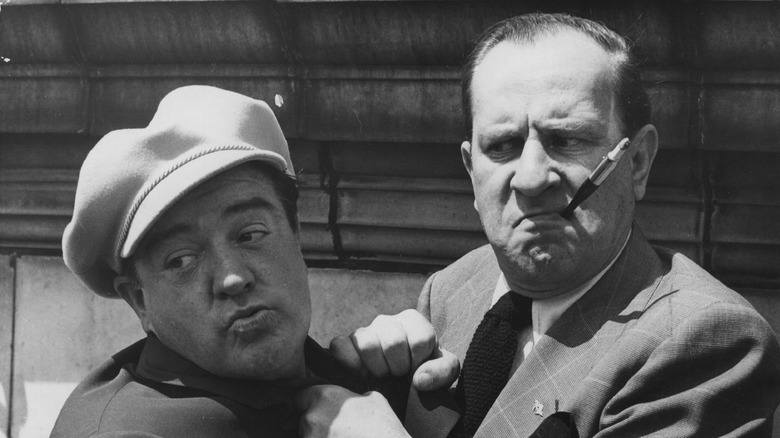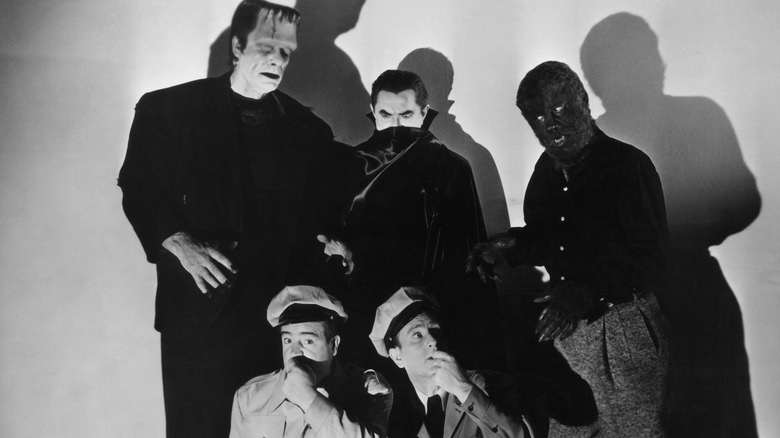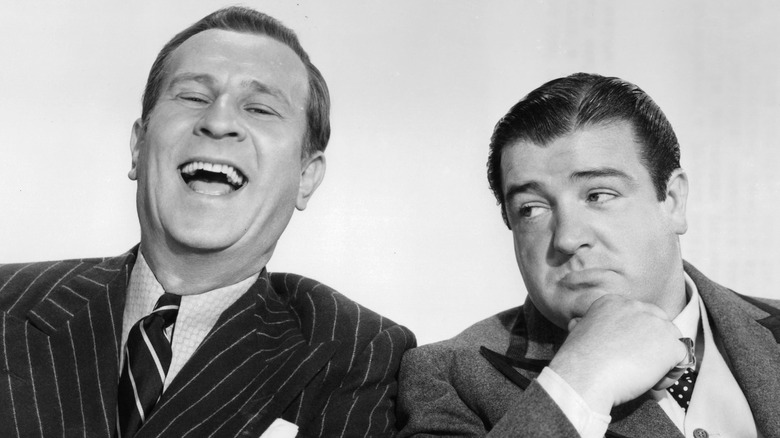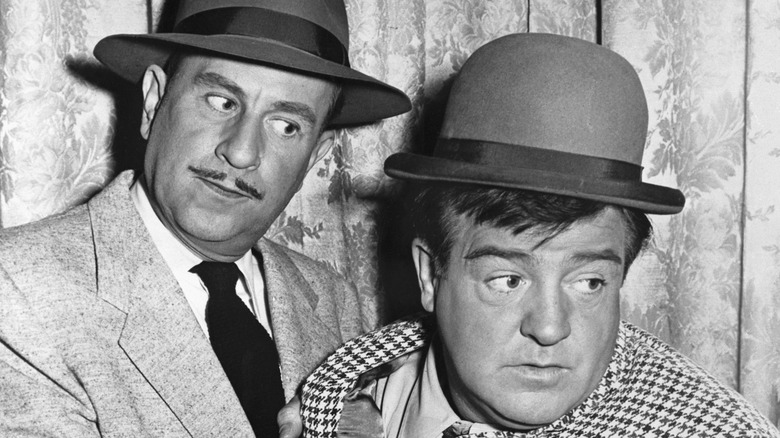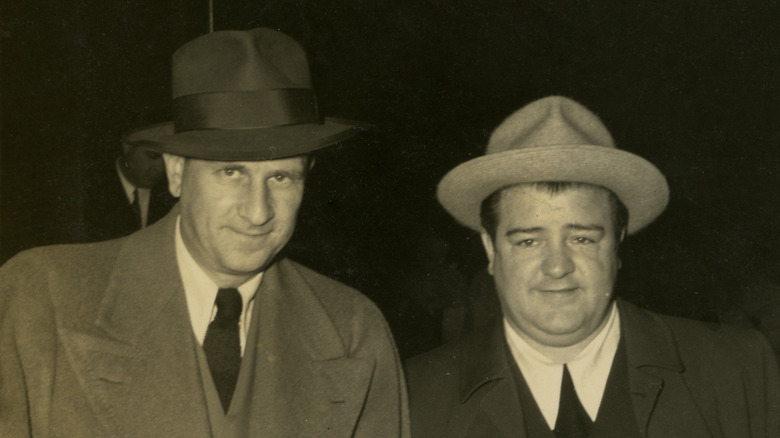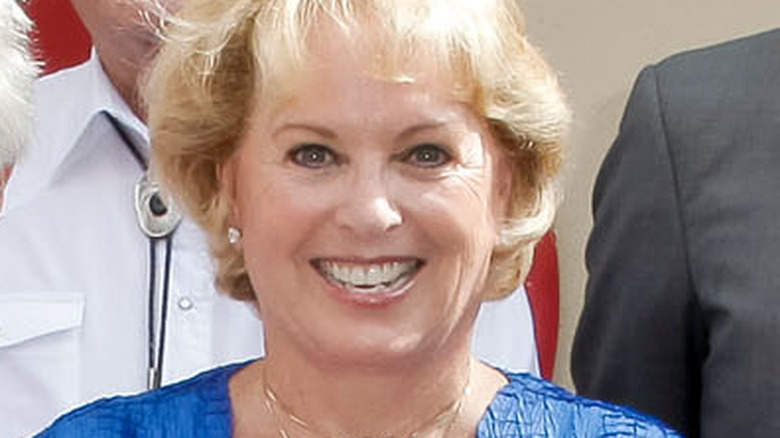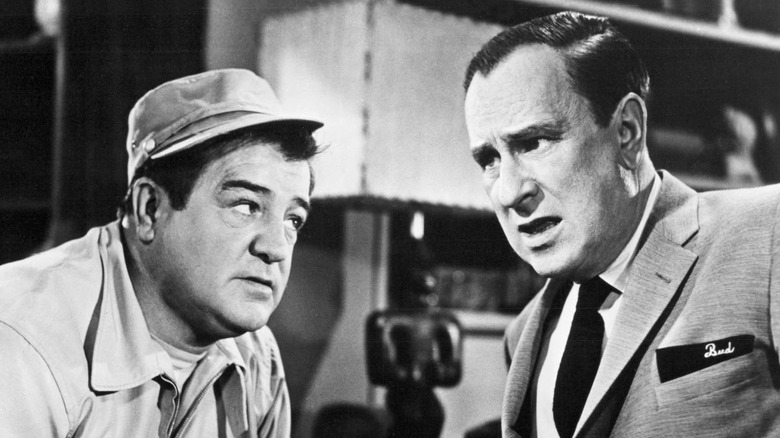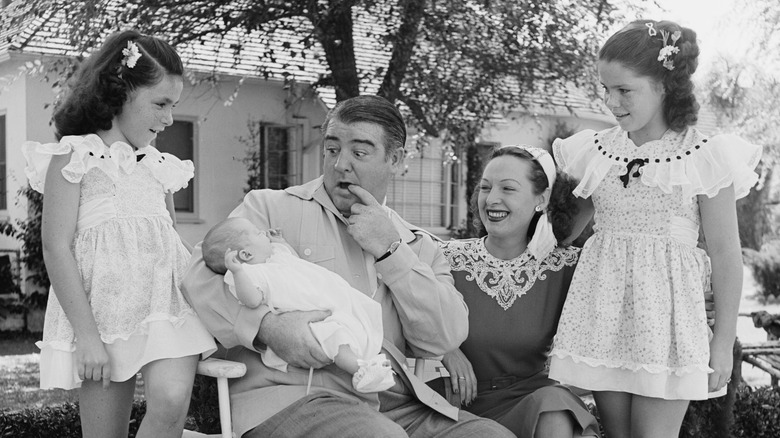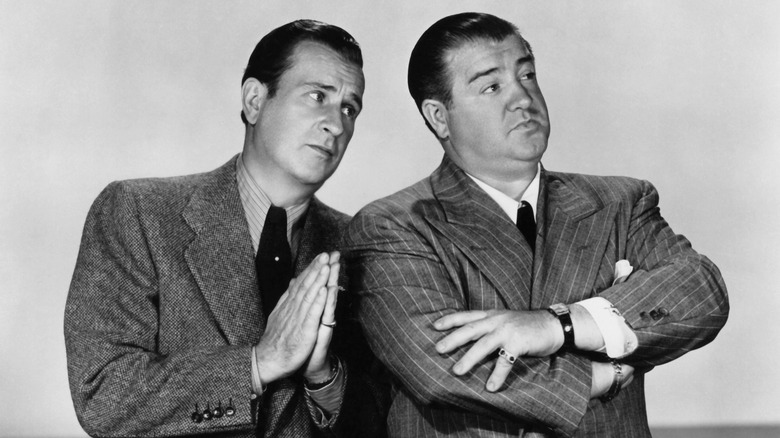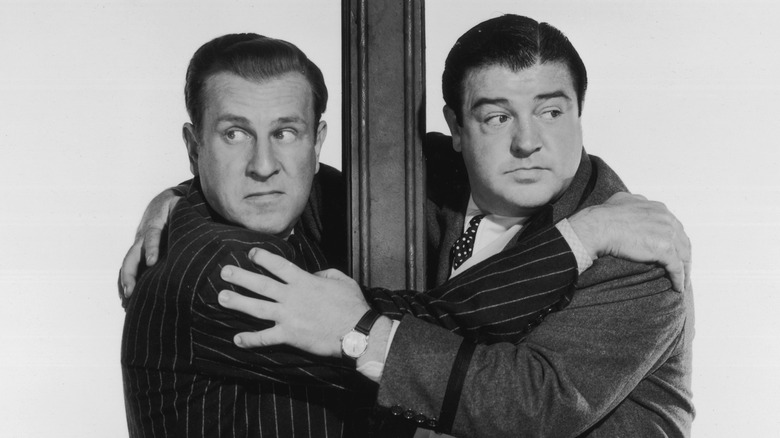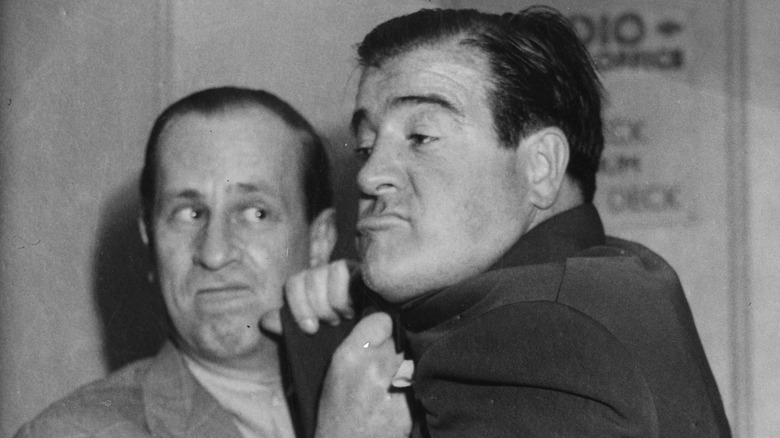What Abbott And Costello's Last Movie Was Like Before They Died
William Alexander "Bud" Abbott and Louis Francis Cristillo (stage name Lou Costello) had come a long way by 1956, the year "Dance With Me, Henry" reached theater screens. The early life of sharp straight man Abbott is somewhat obscure; he was born into a family connected to the circus, but spent time as a teenager a virtual captive on a Norwegian ship. The rotund comic Costello initially pursued athletics. But both were New Jersey natives who found each other through the burlesque theater circuit. Their individual shticks were well-developed by the time they began performing together, with their partnership becoming official in 1936. The chemistry they shared as performers, and their well-honed routines, led to great success on the stage and the screen. Universal featured them in movies for over 15 years, and their films are treasured as a rare surviving example of classic American vaudeville.
Their success endured in the immediate postwar era. But time and changing public tastes caught up with Abbott and Costello in the 1950s. While they remained popular with audiences, there was fresh competition for the title of most beloved comedy duo in the form of Dean Martin and Jerry Lewis. There was the increasingly tired and formulaic nature of the scripts Universal had them perform. And there was the stars' age and long-simmering tensions. With all these forces pressuring their careers, "Dance With Me, Henry" became not only Abbot and Costello's last film, but their last performance together at all.
Their last film was their first out of their Universal contract
While they got their start in the traveling burlesque circuit, Bud Abbott and Lou Costello's film career was almost entirely based at Universal Studios. They first signed with the company in 1939, with their debut film, "One Night in the Tropics," premiering a year later. A long-term contract aimed at turning the pair into film stars got underway with "Buck Privates" in 1941, a war comedy so raucous that it was co-opted by Japanese propaganda to mock the American military. One of the most enduring films made under that contract was "Abbott and Costello Meet Frankenstein," which also let the studio get a fresh round of profits from their beloved horror characters.
But if "Abbott and Costello Meet Frankenstein" itself is well-regarded, its production in 1948 marked a shift in the way Universal handled Abbott and Costello's career. The formula for their films traded heavily on the boys meeting odd characters or going to odd places, to diminishing returns. Despite their declining box office, Universal hoped to re-sign the comedy team after their contract expired in 1955, but Costello refused (per Bob Furmanek and Ron Palumbo's "Abbott and Costello in Hollywood").
"Dance With Me, Henry" was the pair's first film after walking away from Universal. It was produced by Bob Goldstein, shot at RKO-Pathe studios, and distributed through United Artists. The move came with color and Cinemascope, but no new long-term contract.
It was their first film without their head writer, and their last with their favorite director
Bud Abbott and Lou Costello didn't go into "Dance With Me, Henry" with the thought that it would be their last film together. But even if it hadn't turned out that way, "Dance With Me, Henry" was always going to be a seminal movie in their career, because it was their first film made since the death of John Grant. According to Bob Thomas's "Bud & Lou: The Abbott and Costello Story," Grant was the duo's primary writer and was so integral to the act that he was counted as its third member. He and Costello had a falling out over Hollywood's postwar Red scare, though he contributed to Abbott and Costello scripts at Universal until his death in 1955. In his place, William Kozlenko and Leslie Kardos developed the story for "Dance With Me, Henry," while Devery Freeman wrote the screenplay.
If "Dance With Me, Henry" saw Abbott and Costello without their longtime scribe, it did reunite them with one of their favorite directors. Charles Barton first worked with the pair on "The Time of Their Lives," the first of nine movies they made together. He got along with both men and had better luck than most directors at coaxing specific performances out of the temperamental Costello. Barton kept "Dance With Me, Henry" on budget and schedule and let his stars goof around with journalists about their material between takes.
Abbott and Costello's personal relationship was strained
On screen, the relationship between Bud Abbott and Lou Costello was clearly defined: Abbott was the mean schemer who pushed around Costello's bumbling man-child. In life, some who knew them described the relationship as almost reversed. It was Costello who was the hot-tempered and difficult one, with Abbott the loyal follower who endured frequent arguments with his partner. Though they were friends, by the time cameras rolled on "Dance With Me, Henry," the two had weathered severe altercations, and the personal and professional bonds between them were weakening.
One of their fights was over money and credit. The pair's earnings were originally split 60/40 in Abbott's favor, later moving to 50/50. Costello — egged on, in his daughter's estimation, by the sycophants around him (per Chris Costello's "Lou's On First: A Biography") — eventually wanted the 60 percent for himself and top billing, the latter demand only frustrated because Universal refused. "Dad backed off," his daughter wrote, "but from then on, there was a permanent chill between my father and Bud whenever they weren't actually working."
Away from work, Abbott and Costello infamously fell out in 1945 over household staff. Abbott still supported Costello's charitable endeavors, and Costello helped Abbott with his epilepsy. But Abbott's drinking, largely done to cope with his condition, was affecting work by 1956. And Costello had been nursing a desire to change his work, to do something more dramatic, for some time.
The film was an attempt to try something new with the act
Bud Abbott and Lou Costello came to "Dance With Me, Henry" from a run of formulaic pictures at Universal Studios. The game plan since 1948 had been to put the boys up against some weird force that jarred in a humorous way with their stock characters. They faced monsters, mummies, outer space, and the Keystone Cops before the formula was run into the ground. But even before "Abbott and Costello Meet Frankenstein" set that pattern, the duo's films traded heavily on verbal and slapstick material that either derived or resembled their days in vaudeville.
That such patterns had gone as far as they could was evident — at least to Costello, who saw "Dance With Me, Henry" as a way to make a fresh start. "No matter what we do, it looks like something we've done before," he told the Associated Press (via Bob Furmanek and Ron Palumbo's "Abbott and Costello in Hollywood"). "The critics murdered us. We've agreed: let someone else do slapstick. We've had it."
Costello was delighted with writer Devery Freeman's decision to focus on a more heartfelt story; Freeman later claimed that Costello was so committed to the sentimental aspects of the script that he didn't realize it was still a comedy. Abbott was also impressed with the script, and the film was a rare occasion when the team didn't fall into ad-libbing. Ironically, this was later blamed for the pacing of their dialogue.
It co-starred a Mouseketeer
The plot of "Dance With Me, Henry" revolves around the owner of a children's amusement park (played by Lou Costello), who gets mixed up in a money laundering scheme through his friend (played by Bud Abbott) that almost costs him custody of two adopted orphans. The primary figures in the supporting cast are those playing gangsters and busybody members of the welfare board. With a children's park and orphans being a prominent aspect of the story, however, there are also prominent child roles. And one of those was filled by a member of the Mickey Mouse Club.
Sherry Alberoni still went by Sherry Allen when she was cast in "Dance With Me, Henry." She'd gone by Allen since being cast in "The Mickey Mouse Club," a show she watched religiously and joined at the age of nine. The name change was made to sound less ethnic in 1950s America. Alberoni attributed her appearances on "The Mickey Mouse Club" to her being cast in "Dance With Me, Henry." "Lou Costello had a daughter, Chris, who used to watch [the show] with her daddy," she told The Orange County Register. "He was looking for a little girl to play his daughter in the movie, and he liked my lisp, so he called my agent." Costello bought Alberoni's contract from Walt Disney to secure her casting. She's said in years since that she loved working with both Abbott and Costello on the film, remembering them as kind souls.
Abbott and Costello were both in bad physical and financial shape during filming
Though Bud Abbott and Lou Costello went into "Dance With Me, Henry" with hopes that it could mark a turning point in their comedy and their careers, it wasn't as if they had a choice not to work. Both men loved to gamble, and neither was very good at managing his money. Costello's daughter Chris wrote in her book "Lou's On First" that her father was so thrilled with the social aspect of gambling that he often played even when he knew he'd lose. As for Abbott, he was sometimes taken advantage of by dealers and players who plied him with alcohol while he played cards. By 1956, their debts had gotten them both into trouble with the IRS. Work like "Dance With Me, Henry" was desperately needed to settle their back taxes.
Unfortunately, work was slowing down just when Abbott and Costello needed it. The duo emerged from their years under contract at Universal changed and aged men. Years of drinking had damaged Abbott's voice, and his epilepsy continued. Costello's health had been badly damaged by a bout of rheumatic fever in the 1940s. His ability to perform signature physical routines was on the wane, to his surprise and frustration, and at home, his wife was falling into alcoholism. In several retrospective assessments of "Dance With Me, Henry," the stars' decline is considered visible and distracting.
If you or anyone you know needs help with addiction issues, help is available. Visit the Substance Abuse and Mental Health Services Administration website or contact SAMHSA's National Helpline at 1-800-662-HELP (4357).
Costello entertained children during filming
Lou Costello had a reputation for being difficult on movie sets. He would make outrageous demands, refuse to report for work if they weren't met, and enjoyed intimidating co-workers and even his directors. Sometimes, he would take Bud Abbott off the set with him in his tantrums. Such antics strained the goodwill of Universal Studios over the years. But Costello also loved children, and working with them on "Dance With Me, Henry," he showed a softer side to his personality.
The plot of the film called for a large number of children, and screenwriter Devery Freeman brought his two kids to set to serve as extras in scenes with large crowds. "Lou was so sweet and dear about the whole thing," he recalled (via Bob Furmanek and Ron Palumbo's "Abbott and Costello in Hollywood"), "and seemed to love the kids so genuinely. His arms were always around them and he would hug them and kiss them like he was their father ... he exhibited himself at that time as an emotional person with a lot of sensitivity." Freeman credited the incident as helping him decide to stay attached to the film as a writer through production.
Costello also found a way to entertain children in connection to "Dance With Me, Henry" even after it had premiered. His daughter Chris recalled (via her book "Lou's On First") that, when he took his family to see the film, he performed slapstick all the way up the aisle.
Abbott and Costello promoted the film on 'This Is Your Life'
Bud Abbott and Lou Costello wrapped filming of "Dance With Me, Henry" with no thought of making it their last film together. Costello even took to the press to claim otherwise. "We sort of have a very bright future as far as Bud and I are concerned after making this last picture," he told NBC's Monitor magazine (via Bob Furmanek and Ron Palumbo's "Abbott and Costello in Hollywood"). "I think Bud and I are going to stay around for quite a while as long as Devery Freeman or some other writers can write the same kind of stories." During filming, he and Abbott talked up their enthusiasm for going on with more warm-hearted comedy to the Los Angeles Examiner, albeit in an interview that was played partly for laughs.
The pair seemed assured enough of their future together when they appeared on "This Is Your Life" in 1956. The program opened with Abbott and Costello rehearsing a plug for "Dance With Me, Henry" in the style of their "Who's on first" routine. The plug itself was an excuse to surprise Costello, who was the subject of the episode. Abbott, who was in on the joke, appeared later on as a guest. He recounted their career together, acknowledged past estrangements, and expressed his deep gratitude that they had made amends and became friends again since. Less than a year later, their partnership was dissolved.
The film received mixed reviews
"Dance With Me, Henry" wrapped filming on June 22, 1956, for a budget of $450,000. It premiered later that year, on December 14. Lou Costello had lamented during filming that previous Abbott and Costello pictures had gotten a drubbing by critics. The reviews for "Dance With Me, Henry" might not have entirely mollified him. According to Bob Furmanek and Ron Palumbo's "Abbott and Costello in Hollywood," the film had a mixed reception among contemporary critics. Variety and the New York Herald-Tribune were favorably disposed, the latter taking note of the more heartfelt direction of the material and praising Costello in particular as developing his screen persona more along the lines of Charlie Chaplin. But The Hollywood Reporter, while conceding that the film had some laughs, thought it a tepid comedy. And The New York Times came out against any attempt to deviate from the standard Abbott and Costello formula.
In such a review, the Times was not out of step with other critics and filmgoers, who had turned against Abbott and Costello's previous efforts to shake up their image. As stale as that image may have grown by 1956, there was only a limited appetite to see the pair do anything else. Retrospective assessments of "Dance With Me, Henry" have often been dismissive too. Costello's daughter felt that the film was memorable only for being the last Abbott and Costello movie (via "Lou's On First"). Others have found the team's clear weariness evident and distracting.
Did the film's failure contribute to their break-up?
"Dance With Me, Henry" was not a success at the box office. With Bud Abbott and Lou Costello dissolving their partnership so soon after its release, Jim Mulholland put the lion's share of the blame for the break-up on the film's performance in his guide to their work, "The Abbott and Costello Book." But those who knew Abbott and Costello have attributed the split to other factors.
Costello had been yearning for a long time to break away from the old vaudevillian routines and slapstick comedy he and Abbott were famous for. "Dance With Me, Henry" was meant to be a step down that road. His patience for Abbott's drinking had also run out. While the details vary depending on who recounted the story, it does seem that Abbott's alcoholism affected Christmastime appearances the two put in at Las Vegas. Costello, who was also contending with his wife's alcoholism, pushed for the split after the shows were finished.
After the split, Costello appeared in one more film, "The 30-Foot Bride of Candy Rock," and did a smattering of comedy and drama on television before dying in 1959 of a heart attack. Abbott, who was hurt by the split and saddled with debt, never found his way professionally after Costello left him. He died in 1974 of cancer.
If you or anyone you know needs help with addiction issues, help is available. Visit the Substance Abuse and Mental Health Services Administration website or contact SAMHSA's National Helpline at 1-800-662-HELP (4357).
